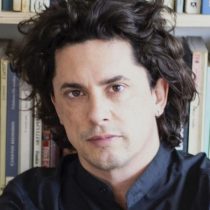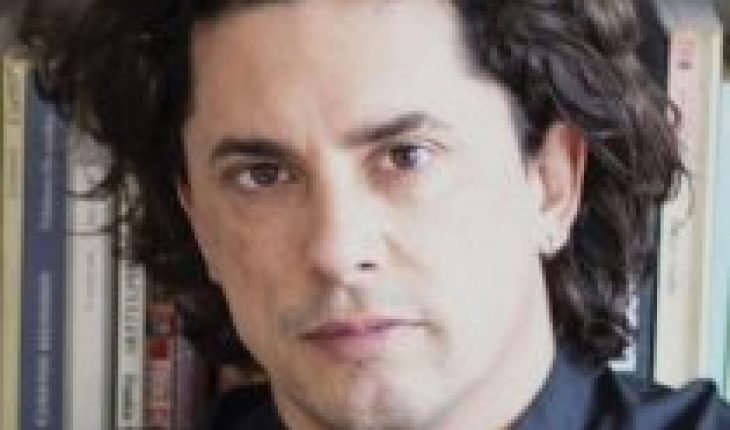
The misfortune of Fritz Haber, the chemist who created the pesticide Zyklon without knowing that the Nazis would end up using it in the death camps to murder members of his own family; Alexander Grothendieck’s mathematical explorations that led him to mystical delirium, isolation, and madness; and the struggle of the two founders of quantum mechanics that generated the uncertainty principle.
These and other stories are part of “Un verdor terrible”, the third and final book by Chilean writer, Benjamín Labatut.
The text — which, according to him, has an “unclassifiable” format within the traditional categories of literature — has been widely recognized: not only was it one of six selected on the Short List of the prestigious 2021 Booker Prize International, but it was also highlighted by figures such as former U.S. President Barack Obama, who recommended it on his latest reading list for the summer.
This somewhat unexpected success has given its author a share of fame that he looks at with suspicion (and rather grudgingly).
“I know the Booker is going to change my life, in fact, it’s already changing it. But I don’t know if I want my life to change. In the end, there is no award, no recognition that will make me write better,” he reflects.
Born in Rotterdam, The Netherlands, in 1980, Labatut grew up in different cities around the world, passing through Buenos Aires and Lima, among others. At the age of 14 he settled in Santiago, the Chilean capital, where he studied journalism.
And then, he devoted himself to writing. “Antarctica Begins Here” and “After the Light” are his first two works, also difficult to classify.
In this interview with BBC Mundo, Labatut reviews the motivations behind his books, his interest in the life —and delirium— of scientists, and his particular way of exploring and presenting reality.
Because reality, he warns, is not only what we see when we open our eyes. “The most important part, in fact, is only available to those who close them.”
– In “A Terrible Greenery” the stories are based on episodes from the lives of some prominent scientists. What particularly appeals to you about their lives and why did you choose them as your main characters?
– For better and for worse, today science is the way in which the human being interacts with mystery. To me, what attracts me is the breadth of his gaze, because he not only studies the transcendental, but also the trivial, the ridiculous, the imperceptible.
I value your ambition, because it is absolute, and I believe that your quest — the search for knowledge — is a crazy journey that has no end, no port in which to run aground.
Zyklon, the pesticide that the Nazis used in the death camps. Credit: Getty Images.
One of the accounts in Labatut’s last book relates to the creation of the pesticide Zyklon that the Nazis used in the death camps.
That boundless fascination is, to my taste, an essential part of the human. It is such a primordial, powerful and unconscious need that we should not be surprised that science and technology have us one step away from the abyss.
Something that does not seem so terrible to me either, because it is precisely there — from the depths, from the void — that wonders arise.
– What kind of stories are you interested in telling?
– The stories that appeal to me are those in which a human being suddenly runs into something he is unable to comprehend.
The difference between the scientists I write about and ordinary people like me is that they don’t sit idly by in the face of the unknown; they have tools, they have a method, as dark as they are luminous, to investigate their obsessions and the questions that torture them.
They are taken by doubt, they suffer their desire to know as those who suffer love, and many times they lose their soul because of that, or they burn, or they condemn themselves, or they are condemned as a product of what they brought into the world.
I use science and mathematics as an excuse to talk about those things that neither words nor equations can touch.
– What are the meeting points of literature and science?
– The desire that animates literature is as extreme as the one behind science: the attempt, failed on principle, to put the world into words, to give a human form to the chaos of experience. But science, unlike literature, has taken on a life of its own; it is as if it were another mind, a cannibalistic system that operates by itself, that justifies itself with its own logic and feeds on itself.
What I do it attracts so much of science is that it is —along with art— a field of the human that goes beyond all limits, that owes no allegiance to anything, and that breaks, almost without regard, with what we consider good and bad, moral and immoral.
Credit: Juliet Labatut
As John von Neumann said, it is useful for any purpose, but indifferent to all. This radical freedom is dangerous, but it is also very necessary, because there must be an inhuman aspect to the human phenomenon, something that does not kneel before the values of the time, that does not recognize any authority, that shit on what is fashionable, that laughs at the great spiritual truths, that ignores the moral and civilizing triumphs of our species.
Literature, on the other hand, flourishes where the horns of the devil peek out, or where there is some of the dust that falls to the fairies, because literature runs behind the traces left by the spirit. It is a great tool to delve into the flaws in the logic of the universe, it serves to catch the mistakes of God.
– How did you create the stories of your last book?
– I am interested in two things that may seem very far apart, but that may be only one: the fundamentals, what we might call the basis of reality, and the flesh, the ideas they embody.
In this book I came across a certain type of stories, very specific, in which something abstract suddenly takes shape; this is the case of Karl Schwarschild, who found the first solution to the equations of general relativity while dying of a necrotizing disease that was eating his skin, on the Russian front of World War I.
Or Werner Heisenberg, who suffered an allergy attack on a desert island, and who managed to unravel the rules governing the subatomic world with his face deformed by swelling and eyelids as swollen as those of a boxer.
In both cases, ideas that seem to be totally alien to the human being become painful matter.
In A Terrible Greenery, Labatut tells the story of Karl Schwarschild, who found the first solution to the equations of general relativity while dying on the Russian front of World War I. Credit: Getty Images.
But the dominant force in the book is chance: the first text, Prussian Blue, is a drift, and I wrote it with a musical method, similar to the one used by Sebald, in which you follow a line, pulling a thread of history, and then braids that point to a strange coincidence, as if you were discovering a hidden sense behind things.
Fact and fiction
– How much fact and fiction is there in each of the stories?
– It is clear that one can separate fact from fiction in a book like mine, but when it is achieved, both fiction and reality become impoverished.
That’s for the simple reason that those two things are intertwined in our everyday experience. Every moment we live, every experience and perception we have, contains real and objective aspects and others that are “fictitious”, imaginary or narrative.
Writing is an act of betrayal. And it’s, in a way, unforgivable. Because one, in writing, is forced to alter reality, to distort history, to pervert your characters simply because you believe, or because you would like to believe, in a higher truth —the strange truth of literature— and before that idol everything is sacrificed.
My book is inspired by reality, real biographies and real ideas, but it is a literary construct, and what prevails is fiction: the heart of each text, the hard core of the plot, is given by fiction, not data, not science.
The facts are there to point to mystery, to seduce (because facts have undeniable force, especially if they are facts that are hard to believe in), and yet the demonic eye of fiction sees deeper. I chose to mix fiction and fact because fiction can illuminate what reality hides.
– Does reality really exist? What is reality for you?
– If you look at reality closely, it’s not at all realistic, it’s mind-blowing. I say that only based on my personal experience: I like to look at things closely. So much so that I carry binoculars and a jeweler’s magnifying glass in my backpack everywhere, as if I were a stupid boy-scout.
Reality exists, of course, but it exists in a way that challenges our understanding. Because reality is not just what we see when we open our eyes. The most important part, in fact, is only available to those who close them. So I’m not going to give a definition, because I’m not interested in definitions. I am not a philosopher or thinker or sociologist. I’m a writer. I follow my interests and my obsessions.
And what interests me most are the crazy dreams of reason, and delirium. And if I’m forced to choose between those two things, mand I’re left with delirium.
– Why do you think you have to have multiple views on reality and how do you extrapolate this idea to the world we currently live in?
– Because every point of view has a blind spot. It is part of the nature of thought and perception. And you only become aware of this if you force perception, or if you extreme thought until it breaks down.
When you do that, when you shred your sense of the world, there are those crevices that Leonard Cohen sang about; those cracks through which the light enters. Because if you accept that your own point of view is limited, limited by essence, the only way to expand on it is to consider multiple points of view.
The Chilean writer explores the struggle of the two founders of quantum mechanics that generated the uncertainty principle. Credit: Getty Images.
The important question is not: is this real? Is this true? If not, what does this show me about the world? With the first we fall into dogmatism, and we leave out many things.
In physics, Bohr enthroned the concept of complementarity: multiple models of reality must be considered, even if they are contradictory. I think it is a personal duty to think in these terms. Today, he who has no more than one pair of eyes is blind.
– In your last book you talk about certain “singularities”, such as black holes, that point to the limit of our understanding. Why are you particularly attracted to writing about them?
– Singularities point directly to the limits of our understanding. That’s why they’re so interesting. They are a fertile field for imagination and literature.
There are multiple singularities in mathematics and physics. They are, so to speak, points of infinity, or places and situations that tend toward infinity, where parameters or quantities become inconceivable.
They also indicate the moment when equations cease to make sense, and are usually a kind of warning mechanism: they show the limits or failures of a theory.
In mathematics, which is abstract, they are not usually as problematic, but in physics it is different, because those equations are supposed to correspond to reality.
Strictly speaking, we shouldn’t be able to talk about “infinite density,” or infinite curvature in spacetime, but those phenomena—or something similar to them—occur in black holes.
Labatut is interested in singularities, such as black holes, because they “point directly to the limits of our understanding.” Credit: Getty Images.
So there are several singularities going around in science, like uncomfortable ghosts, demons that we’d like to exorcise.
– What do genius and madness have in common?
– I don’t think there’s much relationship between those two things. We bread them because both are cognitive exceptionalities. What attracts and frightens us from madmen and geniuses is that they see, or imagine, or hallucinate, a world to which others have no access.
The genius-madman is one in billions, because true madness degrades you. Mental health is a privilege, and outright genius can be a condemnation.
And yet, both genius and madness appeal to me. I admire and envy geniuses because they are psychological singularities, and because they make me believe that the human being is a source of endless surprises. I am very afraid of madness, but I am attracted to any deviation from the psychological norm, because they somehow reflect the endless wealth we have inside our heads.
Even knowing how important common sense is, I think most of us are too sane. A little madness would suit us. A pinch, no more than that. Because you have to know how to get into the delirium of the world.
– What are you looking for with your writing?
– Ecstasy, of course. But I know that’s a lot to ask. I would say that it is enough for them to read me, but that would be a half-truth. Actually, I just write. Literature pays for itself. That they read you, many or few, is a wonderful addition, but without the writing, it is of no use.
I would like my books to be a reminder of the strangeness of the world, and that – as Borges said, he liked the English language as I like – “there are more things”.
Literature and darkness
– You were one of the finalists for the Booker International Prize. How do you take this recognition?
– With a level of cynicism that embarrasses me. I just don’t believe in the value of prizes. Of course the Booker thing was an honor and a privilege, but I’ve never read a book just because it won an award.
I know the Booker has recognized great women authors, and good authors, but I think the awards are an industry game. A way to manufacture prestige. A circus that is totally away from everything which is really important.
– And what do you think was recommended by Obama?
– I don’t know how to take the Obama thing. I feel very ambivalent about that.
He made me famous in my country, with a tweet. But I don’t like to be known. I respect him, I agree with his ideas, and I know what he represents for his country and for the world, so I am flattered, even astonished, that he has recommended my book.
“At what point did we start to care so much about what others read?” asks Labatut. Credit: Juana Gómez.
But I don’t dazzle myself with power, nor do I usually hurt people because they’ve held office. I’m not American either, but a Chilean, so I don’t feel an emotional closeness to any former president of that country.
At what point did we start to care so much about what others read? At what point did what politicians read or don’t read become important?
Obama is a special being, that’s for sure, but I think the best thing you can do with these things is not to take them too seriously. For mental health reasons, I prefer to think that this list was drawn up by one of his advisers.
– You’ve said that you distrust success, that it can destroy you faster than failure. Why?
– Because literature is like a mushroom that requires a certain darkness to flourish. And the attention of others, the applause, the recognition, the success, is a bad fertilizer.





